Your donation will support the student journalists of the Evanstonian. We are planning a big trip to the Journalism Educators Association conference in Philadelphia in November 2023, and any support will go towards making that trip a reality. Contributions will appear as a charge from SNOSite. Donations are NOT tax-deductible.
The Evanstonian’s guide to 2023 school board elections
March 15, 2023
As election season in Evanston approaches, many have announced their candidacy for various school board positions within the community. District 202, home to Evanston Township High School, and District 65, home to the public elementary and middle schools in the city each have their own boards that are influential in most decisions concerning educational policy and much more. Here is the Evanstonian’s guide to the candidates up for election.

District 202
A year after conducting the search for a new superintendent, ultimately landing on Dr. Marcus Campbell, the Evanston Township High School District 202 School Board now looks to push a new set of initiatives, centered around goals of literacy, post-college plans, racial equity and social-emotional learning.
In addition to these goals, ETHS has navigated numerous conversations of late. Discussions around in-school truancy, metal detectors and other weapons systems and more have shaped the trajectory of board meetings thus far this year.
The Evanstonian spoke with the four candidates who are running for the three open four-year terms on the school board. Mirah Anti, a current board member and Director of Equity & Inclusion at Highland Park High School and Deerfield High School District 113, is running unopposed for a two-year position on the board as well.
Two of the candidates, Monique Parsons and Elizabeth Rolewicz, are running for re-election, while Leah Piekarz, former counselor at ETHS, and Kristen Scotti, a disabilities advocate, look to become board members for the first time.
Below, find profiles of all four candidates. Early voting for this election and all elections begins on March 20, while Election Day is April 4.
_______________________________________________________________________________________________________________________________
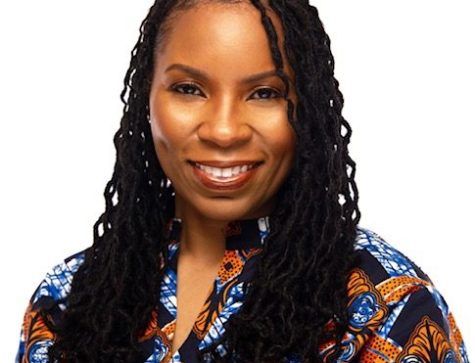
Monique Parsons
The community of Evanston has been a perpetual part of Monique Parsons life. She is the current Vice President of the District 202 Board of Education, and is running for a third term. Although she now strives in her work as a public official, she has many other roles in the community that brought her to this position. She is the President and CEO of the McGaw YMCA, and she specializes in youth development. She has sought to illuminate and diversify voices in the community, and become a part of the solution, with the goal “to promote a school of culture that centers our students’ well-being.”
“I am really concerned about creating a safe, welcoming and belonging environment that affirms, that’s inclusive for all students, family and staff,” said Parsons.
Parsons is deeply rooted in Evanston and believes in a strong sense of community. She was born and raised in town, attending Walker Elementary School and Chute Middle School. She attended high school in Cincinnati, Ohio for creative and performing Arts. Subsequently, she moved back to Evanston after college. She remembers feeling herself represented by local authority figures, as well as being held to high expectations in regard to achievement and behavior in school.
“I remember just being loved by my family and my community,” said Parsons.
Her previous campaign began when she noticed her voice as a single mother was not being accurately reflected in decision making. She believes that the board is very responsible for student achievement and its actions should be reflective of this.
It takes becoming competent, culturally competent, to understand what equity really means and then to also create an environment that is welcoming and belonging for those that are most marginalized or feel left out.
— Monique Parsons
Her biggest draw into ETHS was her son’s excellent experience at the school. After what she found to be a great experience for him, Parsons wants to help create that experience for all students that enter ETHS. She believes that, regardless of identity or extenuating circumstances, every child that walks through the doors deserves the best ETHS has to offer.
“We’re teaching them all the same way because we value you,” said Parsons. “It takes becoming competent, culturally competent, to understand what equity really means and then to also create an environment that is welcoming and belonging for those that are most marginalized or feel left out.”
Running for a third term, Parsons has been a part of an effort to improve locker room conditions for students, as well as an initiative to address literacy in the district. Recently, she advocated for all community members’ voices to be factored in when revising the board’s agenda. This helped ensure equitable administrative goals that were aligned with the community’s values.
One major goal Parsons has is to promote community engagement, whether that’s talking with families of students or working closely with District 65. The hope is that this will better the ETHS student experience and create an environment conducive to learning.
“The goal is to make sure that we provide an equitable and excellent education at ETHS, that we promote school culture that centers our students’ wellbeing, ” said Parsons.. “[We need] to provide fiscal accountability and transparency, but also to strengthen community engagement and partnership.” This goal has been sustained throughout her time on the board. Looking forward, she hopes to accomplish her overarching goal of creating a sense of affinity and belonging for every student.
“My vision is to make sure that every child feels like we’re taking care of them. And if we’re taking care of them, we’re providing what they need. And it’s not just about my child, or someone you know, it’s about all of our children in this very small community,” said Parsons. “Because we can do it in this community, and students can say that they belong, not only at ETHS, but every place they go.”
_______________________________________________________________________________________________________________________________
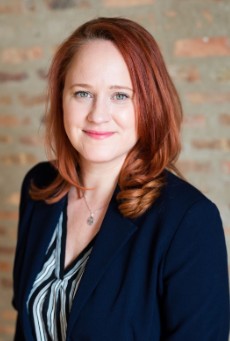
Elizebeth Rolewicz
When Elizabeth Rolewicz first moved to Evanston in 2013, she was not expecting to begin a life in politics. Rolewicz was simply a mother who wanted to give her children the best education and opportunities possible. Then, she noticed disparities and injustices in the community.
“I was hearing from the community that Black and brown students, in particular, were not reaching their highest possible achievement,” Rolewicz said, “I became interested in that topic, and I wanted to be a part of it and support the schools and network.”
Despite only being involved with ETHS and the surrounding community for four years, Rolewicz has played a substantial role in various Evanston volunteer organizations and school districts. Before the 2019 school board elections, when she was elected to her first term on the District 202 School Board, Rolewicz balanced working at her independently owned multi-media artistry studio, helping young girls develop confidence and life skills as a Girl Scout troop leader and being a certified foster parent for children in need.
Currently, Rolewicz is working with the community to try and fix injustices she has seen in the Evanston area.
“I’ve completely committed myself to the Evanston community and to ETHS as a school,” she said.
Rolewicz graduated from the University of Illinois at Chicago with a Bachelor of Fine Arts in film/video and photography arts while also minoring in women’s studies. While completing her degree, Rolewicz continued to find ways to pursue her passion for community service.
“I’ve always found [community service] as very fulfilling work,” she said. “It is certainly a priority in my life.”
When initially elected for the ETHS school board more than four years ago, Rolewicz ran on a racial justice platform.
“Every single student deserves to benefit from the outstanding growth opportunities that abound at ETHS – but far too often, where we come from predicts who we become,” Rolewicz said on her campaign website.
Only when all students are able to succeed can we see overall improvement in the school.
— Elizabeth Rolewicz
Rolewicz is aware of her privilege and hopes to utilize it to help further fair education policies for students of color and students with learning disabilities. Throughout her four-year term, she prioritized students “with the greatest need” so that the district can see improvements across the board.
“[The school board] needs to stay on the course of improving outcomes for our Black and brown students and our students with IEPs,” Rolewicz said. “Only when all students are able to succeed can we see overall improvement in the school.”
Rolewicz plans to use surveys to assess the functionality of the board’s current plans use the data provided directly by students to formulate new ideas to improve the weakest areas.
One such change that Rolewicz has been able to help implement was hiring Dr. Marcus Campell as the new superintendent in 2022.
“I’m really proud of the fact that we’ve got a lot of community input, and through that, we were able to reach out to the community, conduct surveys and talkback, and even host the community interview of Dr. Campbell as a candidate,” Rolewicz said, “I’m proud of what a thorough process we went through in order to get community feedback in the hiring process.”
Rolewicz’s goal as a member of the school board is for students of color to feel a sense of belonging in ETHS. The student summits are one way she hopes to promote this feeling.
“Some work I’ve been particularly proud of is the expansion of the student summits and how well they’ve been attended. Students get so much benefit from [the summits], and I feel like it fosters a sense of belonging. I hope that by showing students that they belong [at ETHS], they’re able to reach their highest potential,” Rolewicz said.
Community and student input is at the forefront of Rolewicz’s mind as she makes plans for the future of district 202.
“I want everyone to feel like they have a place here and a voice,” she said.
Ultimately, Rolewicz hopes that through her position on the school board, she will be able to bring change that will benefit students in need and bring District 202 together as a community.
“An ideal ETHS would be where everybody feels like it’s their school and realizes that they are a crucial part of the community.
_______________________________________________________________________________________________________________________________
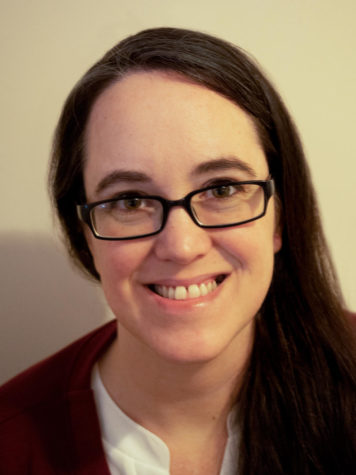
Kristen Scotti
In the mid-1990s, Kristen Scotti was a student at a West Chicago Community High School. Yet, unlike many of her classmates, Scotti experiences several chronic conditions, including ADHD, autism, a connective tissue disorder, as well as dysautonomia. These conditions have permanently altered the way Scotti navigates life, especially within school environments.
“I was the quiet neurodivergent person. It was internalized. So I was kind of just forgotten about in school,” said Scotti. “I have a connective tissue disorder, and I also have dysautonomia. They started manifesting as you get a little bit older, more teenage age instead of when you were born, which made high school very difficult.”
Like many people who experience similar disorders and symptoms, Scotti has been faced with ableism since her childhood, making it difficult to cope and adjust to traditional school environments. As a disabled person, she has been forced into a life of self advocacy, something that disabled students today are incredibly familiar with. Due to the extra challenges disabled students face, many often take non traditional schooling paths, which is something Scotti has experienced.
She did graduate high school but didn’t immediately go on to college. She and her family simply couldn’t afford it, and it just wasn’t feasible at the time. Scotti moved out as soon as she graduated, but it was difficult to get and maintain jobs without a college degree. She often had to work two positions to afford necessities like rent and food.
“For several years, it was more odd jobs,” Scotti said. “I would usually have a primary job and then jobs for supplemental income. I was a paralegal for a law firm, I worked in a courthouse for a while, I was a credit manager for a trucking company for a good while. Those were my more constant jobs, and then I had a whole lot of random stuff like telemarketing and stuff like that.”
It took until she was 29 for Scotti to move on to college, first doing night classes at a community college. Initially, she just wanted to get a degree and a decent job. Then she took an astronomy course with another professor whose class she loved. That class would change her life.
“He talked about these NASA opportunities, these research opportunities you could do, and I was like, ‘Oh, I want to apply for that,’ not thinking I would get in. I got a short internship thing. It was an aerospace scholars program. I got into that, then I applied for another one, and I got that too.”
Scotti started doing microgravity research, taking multiple rides on parabolic flights that simulate anti-gravity to conduct research. She continued doing this, eventually moving into material science. Scotti got involved in the Jack Kent Cooke Foundation, the largest scholarship provider in the United States, and she ended up winning a full-ride scholarship to Northwestern University.
“The process was I was supposed to submit two essays to start with to determine if they were going to recommend me,” said Scotti. “I was really insistent I wasn’t going to get in, and I was really busy with finals. So I only actually submitted one. I didn’t even realize I had submitted it, and then I got a call back that I was recommended. I needed to hurry up and finish the other essay, I was shocked. So I submitted the rest of my essays, and then I got a call that I won. That was probably a core memory for me.”
According to Scotti, Northwestern, as good of a school as it is, isn’t the most accessible university. The campus is very spread-out, complicating things for disabled folks. In lab science specifically, it is challenging when dealing with a disability.
Beyond her challenges, Scotti has done very well academically while at Northwestern. In 2016, she was selected as an Undergraduate Awards regional winner in Math and Physics for her paper Ice-Templating in Microgravity: Toward the advancement of environmentally responsible materials processing – on Earth and in space. The research was about making porous materials, specifically using microgravity, to understand how gravity influences the process of making these structures to make them more environmentally friendly and better on Earth.
“I definitely wouldn’t say I’ve thrived,” said Scotti. “It’s more been survive than thrive. I can’t say that I would recommend this for somebody because Northwestern isn’t great for disabilities. Some majors are worse than others, and lab science in particular is very tough. So it’s just been surviving.”
After moving to Evanston, Scotti had a child, who, now a junior, has helped her understand that the problems she faced growing up neurodivergent are still present. This motivated her to run for a District 202 school board position.
“I’ve seen some of the great equity work that’s being done at the district. But I’m seeing that it could be better with more of an intersectional lens. I can add to that,” said Scotti. “My top priority is looking at suspension data, because disabled students are getting suspended way too much. A very close second priority is revamping the assistive tech program because, in a lot of classes, students aren’t getting what they need.”
Scotti wishes to leave no child behind at ETHS and District 202.
“I watched a lot of board meetings over the years, and it’s discouraging to watch people celebrate metrics when there’s a 99 percent graduation rate because, you know, that one percent that are not graduating, these are students, these are humans, these are people. I cannot be okay with that unless it’s 100 percent,” said Scotti.
Scotti wants to make small changes to get ETHS as close to perfect as possible regarding disabilities. While ETHS does offer some resources for disabled students, these resources are often only accessed through means of self advocacy by the students themselves, which is a cycle that Scotti would like to break. By being the representation that disabled students need, she hopes to bring these issues to the frontlines of discussions surrounding student success and well being. According to Scotti, nothing is ever perfect, but there is massive room for improvement that needs fixing here at ETHS and beyond.
“The alternative,” she said. “The alternative is terrible. It’s a life of struggling in a lot of cases. I look at the data in my community, and I want it to get better. I mean, in the worst-case scenario it’s life or death. In a slightly better scenario, it’s prison. This is not a joke.”
_______________________________________________________________________________________________________________________________
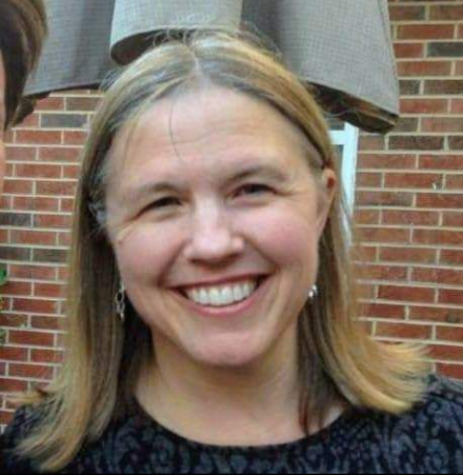
Leah Piekarz
In the past few years, ETHS has been toeing a line many high schools are forced to walk: the often-treacherous balance of academic performance and the prioritization of student wellbeing. It seems that every administrative action the school takes tips this scale too far in one direction or another– every issue sometimes feels like a lose-lose scenario.
District 202 school board candidate Leah Piekarz believes the root of this issue is a disconnect between administrative higher-ups and the student body.
“I think students need to feel seen and heard and not feel that they shouldn’t be seen and heard,” Piekarz said. “We need that input. We need to know what teachers’ experience is. But I think we also probably have to balance that with maybe some evidence-based research on what is working and what’s not working.”
Having retired from ETHS just last year after working for 21 years as a counselor, Piekarz feels she is uniquely qualified for this position. In her mind, occupying such a role for such a long time has helped her forge relationships not only inside the building but in the greater Evanston community.
“I’ve become a part of the community,” she said. “I’ve worked here. I live here. My husband also has lived in the community and worked at the high school for over 30 years. My two stepchildren graduated from [the] high school. So what I think that means is that I really do understand what happens on the inside of ETHS.”
Piekarz grew up in Western Springs, a suburb of Chicago around 20 miles from the city. Her first job in education was as a Spanish teacher in Chicago’s south suburbs, where she worked for seven years prior to earning a Master’s Degree in school counseling. Her first exposure to Evanston was through an internship at ETHS. She was immediately drawn to the town, which she attributes to the similarities Evanston shared with where she formerly worked.
“I did my teaching on the south side. It had a diverse student body, a very working-class neighborhood,” said Piekarz. “I felt like [Evanston] was a pretty progressive district and had a unique mix of diversity. And I was really drawn to that.”
Piekarz sees her experience as a counselor setting her up to deal with student wellbeing–both physical and emotional-if elected to the school board.
For Piekarz, one of the most paramount facets of student well-being is mental health.
“I have a first-hand view of the mental health crisis and just how important social-emotional learning and support is,” she said. “I lived through the pandemic at the high school myself, and can really see how that affected students and staff and our community.”
I have a first-hand view of the mental health crisis and just how important social-emotional learning and support is.
— Leah Piekarz
However, since ETHS returned from its Covid-induced hiatus, mental health hasn’t been the only aspect of well-being at the forefront. On December 16th, 2021, two firearms were recovered by an ETHS resource officer. Earlier this year, another gun was found on the premises, an attempted kidnapping occurred just blocks from the school, and a man was shot outside of the McDonald’s on Dodge and Dempster with ETHS students present. Piekarz emphasized how firmly she believes that physical and emotional safety go hand in hand. That said, she knows such disastrous incidents must be addressed: “We are sadly at a point where we do have to look at– what is our weapons detection system?” Said Piekarz. “I sadly think that we’re just at a point where we can’t not consider that.” Nevertheless, Piekarz was repeatedly keen on clearing the air of any misconceptions about her stance. In her words, “I also don’t want people to feel like they are under constant surveillance. I don’t want people to feel policed at school.”
When interviewed last year on the subject of her retirement from counseling, Piekarz remarked that she wanted to enjoy some relaxation in her new-found time. Now, less than a year has passed and she’s running for school board. For Piekarz, her love for the Evanston community made her unable to walk away from serving it. Though she enjoyed her– albeit short– time away, certain events on the national scale drove her to get involved in local politics.
“I think this is where what’s happening outside of ETHS and in our larger community in our country has affected me. I think that as we see what’s been happening with the political divisions in our country– what’s happening in Congress. What’s happening across the country, in some cases in schools and school boards. What’s happening with DeSantis in Florida,” said Piekarz, referencing the Florida governor’s recent ban on the AP African American studies class. “It can be overwhelming and can make you feel very disillusioned. And so it seems like I just felt like the thing you have the most control over is your immediate environment. Your local community. And so rather than stand back and be disillusioned and be upset, you’ve got to be part of the solution. You’ve got to get involved.”
According to Piekarz, the principle buoy of her candidacy is a genuine love for ETHS and the Evanston community, one that can only be fulfilled by public service.
“We can create change, and we can do better,” she said. “We can always do better.”

District 65
Coming out of the worst of COVID-19, Evanston / Skokie Community Consolidated School District 65 has since been faced with multiple challenges. From lagging literacy rates, to decreasing enrollment, as well as issues of safety and equity, District 65 and its school board are responsible for navigating these issues in a way that ensures all students learn to their potential, feel safe and seen at school and help the district flourish.
With that said, the stakes for this year’s District 65 School Board elections are high.
There are five candidates running for three spots on the elected school board.
Two candidates, Sergio Hernandez Jr. and Mya Wilkins, are incumbents, looking to serve another term on the board.
Meanwhile, John Martin, Ndona Muboyayi and Omar Salem all are looking to join the board for the first time.
All five candidates have their own stories for why they believe they are the right people to lead District 65 into this next chapter in the district’s history.
Voting for school board elections will take place on April 4, but early voting begins on March 20.
_______________________________________________________________________________________________________________________________
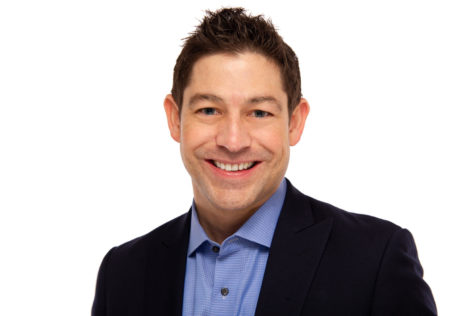
John Martin
Growing up in Cincinnati, Ohio with a teacher for a mother, John Martin, candidate for District 65 School Board, has always believed in the importance of education. Throughout his life, he was supported to further his education, taking him to Chicago for a master’s degree at DePaul University.
“I’ve always had, and it’s something I see in my kids… an unquenchable thirst for knowledge,” said Martin.
Martin moved to Evanston in 2015 with his wife and two children. Despite not living in the city for long, he has been quick to set down roots. He became a coach for the Evanston chapter of the American Youth Soccer Organization, AYSO and later, during the pandemic, became the commissioner.
“[Working with AYSO] gave me the opportunity to get to know a lot of different families from all different backgrounds… I rarely go anywhere in Evanston without running into a friend,” said Martin.
In his current job with a software company, Martin helps businesses to be more effective by guiding them with his expertise. As he works with many accounting businesses, he has been successful in fiscally advising AYSO and hopes to do the same with District 65.
“[I lowered] participation fees by 40 percent, for all families the first year and then another 20 percent in the second year [at AYSO],” said Martin.
Martin balances those analytical skills with emotional ones as well.
“The ancient art of mindfulness grants me the compassion to understand people’s different perspectives [and] respect differences of opinion,” said Martin.
A major factor behind Martin’s move to Evanston was the strong public school system. Currently, he has two kids at District 65 but has been disappointed by it lately.
“One of the things that I think is the most concerning is the emptiness of students. [There is] a 20 percent decline in enrollment in four years,” Martin said.
The most important thing is educating and caring for the whole child; socially, emotionally and academically. And I think recently that academic piece has been missing.
— John Martin
Though Martin does not have any direct solutions on increasing enrollment, he would like to explore the issue once elected. He noted that one thing he would look into was the increase in staff, specifically in the central office, hired while students declined.
Being a public school student, Martin has the desire to support the system. After working with AYSO and deepening his understanding of Evanston and the diversity that sets it apart, Martin aspires to put his plans for the school district into action.
“I have a deep-rooted belief in public education… District 65 has a very proud history that I’d like to build on,” said Martin.
In recent years, Martin has noticed a decline in emphasis on academic excellence in the district. One of Martin’s goals, should he be elected, would be to restore the focus on academics.
“The most important thing is educating and caring for the whole child; socially, emotionally and academically. And I think recently that academic piece has been missing,” said Martin.
One of the biggest challenges is having District 65 remain equitable. In past years, the district has struggled to enact academic rigor that would serve the entirety of the student body. One example of this is the decline in student performance on math in standardized tests. Martin hopes that by providing better support to teachers they will be able to restore District 65 to its past level of academic excellence.
“Equity and academic excellence is essential. Culturally inclusive and reflective education is what we want for our kids. Equity and excellence are not mutually exclusive. They can not only coexist but complement each other,” Martin said.
Overall, Martin would like to see more transparency in District 65. He wants the organization to share why they make policy and curriculum changes with parents.
“I want the board to be an independent institution of transparency,” said Martin.
He aims to help the community and school system heal after the pandemic and the isolation it brought. On the District 65 school board, he would have this chance.
“[Ideally, District 65] would look like a community built on trust,” he said. “ A welcoming place where trust and respect are shared among parents, teachers, administrators, board members and community members.”
_______________________________________________________________________________________________________________________________
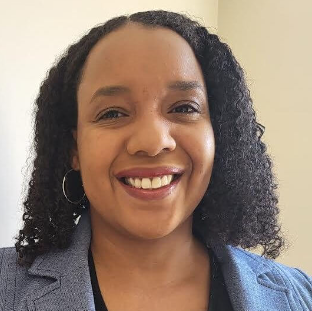
Mya Wilkens
With one year of experience on the District 65 School Board, Wilkins has dedicated herself to improving the equity for the D65 school system and hiring quality teachers.
Wilkins strongly believes that a strong education is the foundation for success, and her passion for education is the driving force behind her appointment to the board.
“It is my mission to make sure that every child is provided with the support, tools and resources they need to get the education they deserve,” said Wilkins in an interview with the Democratic Party of Evanston.
Originally from Ohio, Wilkins moved to Evanston to attend Kellogg School of Management at Northwestern University graduating in 2006. She comes from an academically-oriented family, and currently has two children, one attending Chute Middle School and one at Walker Elementary School. Not only has Wilkins served on the D65 board, but she has also connected with the community by being involved in groups focused on equity in the district, including Walker Black Students Achieve, PEP and the African Black and Caribbean parent group.
As a member of the board and a parent to two children attending D65 schools, Wilkins says she is committed to making positive changes for students. Her goal is to ensure that every student has access to an equitable education that meets their individual needs. With her extensive background in business, Wilkins is able to contribute to the financial and strategic planning of the school district as she believes that her “perspective will help ensure that the district is making the most of its resources to provide high-quality education to every student.” Wilkins’ appointment to the board has also been welcomed by the community, as they believe her experience and passion for education will make a positive impact on the students of District 65.
If Wilkins is appointed to the board in the upcoming election, she is hoping to improve busing expenses and create structure in classrooms. Another important thing that Wilkins will stand by is the racial equity commitments. Wilkins has experienced situations where “when things get tough those equity commitments get put on the back burner,” she said in that same Democratic Party of Evanston interview.
It is my mission to make sure that every child is provided with the support, tools and resources they need to get the education they deserve.
— Mya Wilkins
She believes that it is incredibly important for the district to make sure that doesn’t happen under any circumstance because “at the end of the day it’s important [for the] students, and with the experience that we have we have, to make sure that no matter what situation the district is in we continue to prioritize those initiatives” she said.
Following the election, a new school in the Fifth Ward is soon to be established. Wilkins is thrilled about these plans; however, she believes that it will be important for “the district to continue to work with the community and hear from the community and partner with them.” Wilkins wants to employ forums where community members are able to share their perspectives and experiences. With putting this in action, the community of the Fifth Ward will be able to feel heard on their concerns or points of view.
“I just want everyone to know this is really really personal to me, and this is not like being on the board and running for the board,” Wilkins said. “This is nothing that I came to lightly. I know that it’s a big commitment, but throughout my life, starting from when I was in middle school and started to see some of the issues that are in our education system, it has been something that’s been deeply important and it’s deeply personal to me. Because of that, my commitment and my dedication will always be there.”
_______________________________________________________________________________________________________________________________
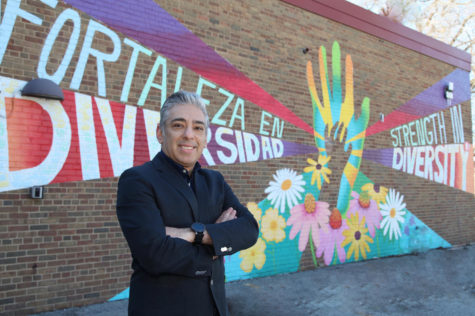
Sergio Hernandez Jr.
Sergio Hernandez Jr. has been a part of the District 65 school board since 2017. Since he was welcomed to the school board, he has been an avid participant in the fight for equality for multilingual students in the district.
Hernandez has been in education for over 25 years. He currently serves as the Director of Family and Community Engagement at the Illinois State Board of Education (ISBE) in addition to serving as District 65 board president. Previously, Hernandez taught in Chicago Public Schools and some of the schools in the western suburbs as well. He has also been a community organizer and an activist whose goal has been to ensure that everyone gets the services that they need. He first got involved in the district after having three children go through the school system and seeing some huge problems in how schools supported multilingual students.
“One of the things I found out in talking to other Latino parents as well as educators was that there were some issues in regards to services for students who are multilingual. Students who were multilingual got evaluated by the schools to see if they require bilingual or ESL services,” Hernandez said. “We ended up finding out that some schools would screen students, particularly magnet schools, and they would give them a choice. The choice was you could either come to the magnet school and not receive ESL services or go to another school that does offer those services. That’s illegal, by federal law and state law.”
Upon learning this, Hernandez organized with a couple other Latinx parents and educators to bring this up to the board, as well as joining a local organization called Latino Resources.
“I really want to stand up for my students, and all students really, who require specialized services and educational studies,” he explained.
Hernandez also explained how privileged and honored he feels to be a part of a school board with such a focus on equity and to be able to serve the community in that way. He went from engaging the board as a citizen to being a part of the board and continues to fight to ensure that all students have access to the resources that they need to succeed in the school system.
“There’s been an educational opportunity gap for many students, particularly our most marginalized students, and what I enjoy about being on this board is that we are able to try and change the systems that have perpetuated or continued to create these barriers,” Hernandez said.
In the future, Hernandez hopes that the school board will work on doing a better job of coordinating and collaborating with the City of Evanston, as well as District 202. His goal is to make sure that they provide the assets and services that students–specifically marginalized groups–and families deserve.
I really want to stand up for my students, and all students really, who require specialized services and educational studies.
— Sergio Hernandez Jr.
He would also like to see young people, such as high schoolers, to start thinking about being civically engaged. This includes registering to vote when you can, and really taking the time to do research on and learn about the candidates.
“It’s important for our young folks to really get involved. We work for [District 65 students], so we need our young folks to hold us older folks accountable so we can make sure that we lay a pathway for a better future for all [students],” Hernandez said, “As a teacher, that’s something that I’ve always believed, that I serve the students and I serve their families and the community and it’s my job to work in collaboration and co-conspire with the people that I serve to ensure that we have a sustainable future for you and your fellow students when you become adults.”
_______________________________________________________________________________________________________________________________
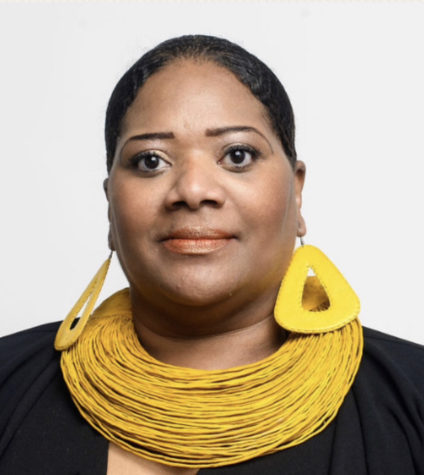
Ndona Muboyayi
Following her parent’s divorce, Muboyayi spent less time at home and more time participating in after-school activities. Whether she was at French class, softball practice, working on an art project for Young Evanston Artists (YEA) or rehearsing for an upcoming Haven Help Us performance, Muboyayi was always involved in some sort of program.
Having traveled to countless places over the world and attending, or watching her children attend, schools in different countries, Muboyayi has observed plenty of teaching techniques and seen how curriculum and resources differ from place to place. Especially after seeing the differences between Canadian schools and District 65 and 202 schools that her children were attending, Muboyayi knew she wanted to make a difference.
I would work on one of the main issues that exist right now, there’s an opportunity gap. There historically have been some inequities when it comes to Black and Brown students, and low-income students in District 65.
— Ndona Muboyayi
She noticed that here there is a language barrier, making it difficult for some parents to communicate with teachers and District 65 about what their student’s needs were. Growing up in a situation where she wasn’t able to advocate for herself, Muboyayi hopes to be a voice for the families and children that can’t stand up for themselves, whether it be because of a language barrier or other social inequities.
“I was the president of the BIPAC with District 65, which is the bilingual Parent Advisory Committee,” Muboyayi said. “At that time, I discovered that there was also a major issue with the Spanish [speaking] parents having problems with being able to advocate for their students because they were not having a lot of their concerns addressed.”
Muboyayi advocated for her daughter and was successful in doing so. Giving assistance to those who are in less fortunate situations or unable to advocate for themselves would be very rewarding in Muboyayi’s eyes.
The students struggling most with communication with the District and teachers are students of color, which Muboyayi also hopes to address by focusing on the opportunity gap.
“I would work on one of the main issues that exist right now, there’s an opportunity gap. There historically have been some inequities when it comes to Black and Brown students, and low-income students in District 65,” said Muboyayi.
To do this, Muboyayi would make an effort to find the students that are struggling and assist them in getting the support that they might need.
“We need to also possibly think about increasing the number of speech-language pathologists as well as increasing reading specialists because at present there is an issue with Black and Brown students and low-income students arriving at ETHS reading far below grade level.”
Even though some students are struggling, and need extra support from teachers and school staff, many are exceeding the current curriculum. Working towards a curriculum plan that is able to benefit all students– those who are struggling, at grade level, or advanced– and include everyone is another goal Muboyayi has.
“I would look to work on addressing the lagging literacy rate,” Muboyayi continued, “I do believe that there are some students that are advanced and I don’t believe that the current curriculum that is available District 65 addresses all of their needs as well.”
“There’s a dire need for someone to be on the board that’s going to actually fight for children and families that need the support for them,” Muboyayi said.
_______________________________________________________________________________________________________________________________
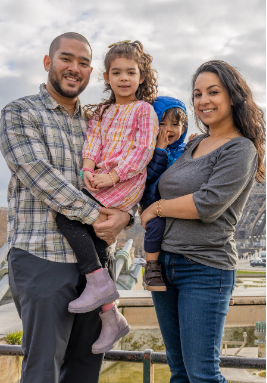
Omar G. Salem
Fourth-grade-aged Omar Salem already knew that he wanted to be a teacher when he grew up. After experiencing some trauma with teachers and other school staff, he knew the changes he wanted to make as a teacher in the future: creating a comfortable environment for all students where their mental health is the educator’s greatest concern.
Growing up only a 20-minute drive away from Evanston, in Morton Grove, Salem attended Niles West High School. Because of his involvement in Distributive Education Clubs of America (DECA) Salem’s original fourth-grade idea of becoming a physical education teacher shifted. The work that he did with DECA led him to attend Illinois State University and study business education.
Through marrying a native Evanstonian and because of his knowledge of Evanston through his work in education, Salem knew that if in Illinois, Evanston was where he would be living. Now with two children, Salem and his family are happily living here.
Currently as a Union Professional Issues Director with the Illinois Federation of Teachers, Salem is on leave from his job as an English Language Learner and Business Education teacher at Niles North High School.
Academics are important. It’s school, and I think a rigorous curriculum is so important. But a rigorous curriculum without trauma-informed educators isn’t going to do anything.
— Omar G. Salem
Despite his long-term goal of working in education, Salem didn’t see himself running for a position on the school board in the past. His new experiences in this different role changed his idea of an ideal career though.
“[In] my experience with my new position I feel like I’ve learned so much,” Salem explained, “and I want to use some of that expertise that I’ve picked up from this position to benefit all children in Evanston.”
Along with this new perspective and title, Salem’s oldest child is currently attending school in District 65, and his younger child will as well. Creating a space where his children, and all children in Evanston, feel safe, and where their mental health is being prioritized, is what matters most to Salem.
“For me, one of the largest, most important but also impactful training that we do, that I’m a part of, is trauma-informed education,” Salem said. Trauma-informed education ensures that teachers are thinking about what students have gone through and that students feel safe at school.
To achieve this comfortable environment, Salem wants to see all teachers have the opportunity to go through this training. “I think the only way to [confront the mental health issues that students have] is through an equitable approach where all educators, not just teachers, but every single adult is trained on [trauma-informed education],” Salem said. “And every single adult is also given the time and capacity to be the best educator they can.”
Salem also acknowledges that the curriculum and learning going on is very important. “Academics are important. It’s school, and I think a rigorous curriculum is so important,” Salem said, “but a rigorous curriculum without trauma-informed educators isn’t going to do anything.”
Even though a well-educated student body is important, and is something Evanston strives to have, students won’t be able to achieve this if there is any discomfort in any classes. Salem wants to ensure that this isn’t happening to any children in and of District 65’s schools.
“I know that students aren’t going to learn if they don’t feel safe,” Salem said.


Obadiah Redwin • Mar 29, 2023 at 7:59 am
Kane’s writing is sublime. Must be rewarded with something, for his writing is spectacular.